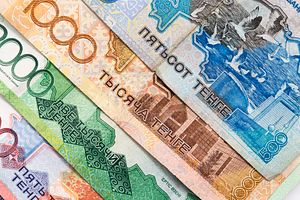Earlier this summer, Kazakhstan lost out on claiming Central Asia’s first Olympics, coming up short against Beijing. Now, though, Kazakhstan can boast a new — and far more dubious — honor. According to Bloomberg, Astana now hosts the world’s “most volatile currency,” with fluctuations in Kazakhstan’s tenge outpacing those of Russia’s ruble and Ukraine’s hryvnia to take the dubious title.
While the ruble’s decline has proven steeper than the tenge’s over the past 12 months – a 41 percent drop against a 33 percent drop, respectively – Kazakhstan’s recent currency swings have whipsawed its citizens’ savings. The currency rested at 185 per dollar in August, but the tenge plummeted in the wake of China’s yuan devaluation, bottoming out at some 300 per dollar a few weeks ago before recovering to 273 per dollar. In moving to a free float, the currency has collapsed nearly 100 percent over the past 20 months.
The decrease flies in the face of pre-election promises from Kazakhstani President Nursultan Nazarbayev, who pledged that there would not be another devaluation following his April election. There would be “no upheavals,” Nazarbayev said. “I have already talked about it and the people of Kazakhstan know me well enough. If anything like that is looming ahead, I’ll tell you, and I will tell you how to protect ourselves from that.” While the drop may not be a technical devaluation – akin to the currency’s 19-percent decline in February 2014 – the technical discrepancies will be of little solace to those earning and saving in tenge.
In addition to China’s yuan devaluation, a pair of realities have continued pressuring the tenge, just as they have the Kazakhstani economy as a whole: the collapse of hydrocarbon prices and the attendant Russian recession. As hydrocarbon pricing shows no signs of a significant rebound anytime soon, the World Bank recently slashed another projected GDP point off of Russia’s 2016 outlook, noting that a second year of recession likely loomed – meaning that the fallout for those economies tied most closely to Russia’s will only continue.
As Bloomberg reported, Kazakhstan’s central bank – which has already spent more than $1 billion to shore up the tenge – responded by increasing the “overnight repo rate, which was set as the new benchmark after the central bank abandoned the currency peg … to 16 percent from 12 percent” last week. However, as an economist with whom they spoke noted, the move carries clear downsides; the bank could instead have opted to slash the rate in order to boost economic productivity. The pressure on the tenge may be relieved for the moment, but the broader burdens on the most volatile currency in the world look set to continue for time to come.

































